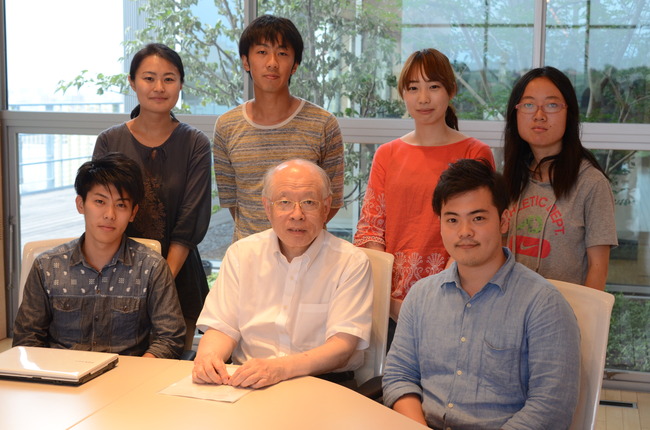University Professor Ryoji Noyori, President of RIKEN and a Nobel Laureate in Chemistry (2001), has contributed numerous articles to "Kamitsubute" in Chunichi Shimbun since January 2013. Based on the articles, he holds regular academic talks with students at Nagoya University. At the Seventh Noyori Academy Salon, held on June 27, 2014, Prof. Noyori and five students from different backgrounds openly discussed the topic of "Transition in the Value of Science." Prof. Noyori explained that science should be inherently destined to engage with society, and he claimed that although scientists should contribute to deepening scientific knowledge and the progress of technology, they are currently inclined to be egocentric. He further criticized that their primary goals and objectives of research are to get high evaluation score by research article publications and credit among researchers.

Exchange of Good Ideas
Keiko Doi, a junior at the School of Literature
"The Fukushima Daiichi nuclear disaster made me believe that although technology is progressing, human intellect is not."
Prof. Noyori
"People lose broader vision when science becomes segmentalized. Every scientist heartily researches a topic in her/his specialty area, and believes that the findings will contribute to the public good. The mission and objective of science are to pursue the truth. I believe that it is important to exchange ideas, not only to enhance knowledge, but to develop technology based on the truth."
Masahiko Yoshimura, a second-year student at the Graduate School of Science
"There are many segmentalized disciplines in the field of chemistry and physics. It seems that each research field is isolated and researchers cannot overcome disciplinary differences. Is it difficult for experts to move beyond their disciplines and to interact with each other?"
Prof. Noyori
"When you discover something new, a greater mystery appears one after another. Segmentation is inevitable, but networking among physics, chemistry, biology, etc., is necessary. Even a genius cannot solve serious problems, such as global warming and energy matters, all on his own."
Ryo Nakamura, a senior at the School of Informatics and Sciences
"I am currently studying Computer Science in a theoretical field and I recently had a chance to talk with someone who works in more practical research and technical development, and we could not understand one another. I empathize with your claim that scientists are inclined to be egocentric."
Prof. Noyori
"Theory and practical work are inseparable. Without theory, some technologies cannot be realized, but there must be good theories as well as good practices. It is alright that some researchers are egocentric, but keep in mind that not all of them have this trait. I hope that scientists as a whole will consequently contribute to our society."
Hou Hui Li, a freshman (G30 student) at the School of Science
"I hope that scientists will create a network where anyone from different countries can work together to solve important and big challenges."
Prof. Noyori
"The world consists of many people from various cultures. If these people assemble and share their ideas, then a greater world will be realized. My scientific ideas were created and fostered through intrinsic way of thinking that was vitalized by Japanese culture and history of Japan. It is uninspiring if all of the researchers are from one country."
Daisuke Nakamura, a first-year student at the Graduate School of Bio-Nano-System Science, Yokohama City University
"Science and technology is rapidly advancing while the Japanese population is decreasing. I believe that increasing the number of researchers can benefit the entire world. What should we do to increase the number of scientists in the world, especially in developing countries?"
Prof. Noyori
"I do not believe that science is almighty, but it is necessary for dispersing scientific knowledge throughout the world. Therefore, every global citizen needs to acquire some level of scientific knowledge."
Original article was published in Chunichi Shinbun on June 28, 2014.